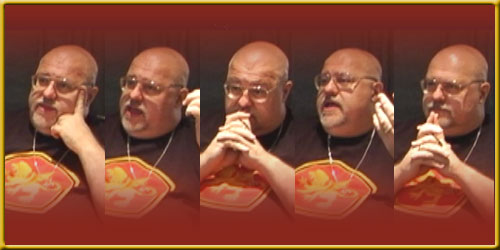David Weber: Honor in Politics

 Now out from Macmillan Audio is David Weber’s How Firm A Foundation, read by Charles Keating. It’s part of the Safehold series, mentioned in Part 1 of my interview with Mr. Weber.
Now out from Macmillan Audio is David Weber’s How Firm A Foundation, read by Charles Keating. It’s part of the Safehold series, mentioned in Part 1 of my interview with Mr. Weber.
Now, for Part 2 of our conversation, in which we get into politics and history and how it plays a role in his writing.
JPH: You mention compromise and extremes between two disparate groups. How much does your own personal politics play into your writing? You talk about religion, but politics is another aspect as well.
Yes.
JPH: And from reading the Honor books I get an impression one way about personal politics and the way you probably lean. But it’s just an impression and a lot of that could just be the way the story plays out as opposed to how you actually feel. How much of these stories are actually influenced by how you personally believe?
 Well, every writer, whether he realizes it or not, steps onto a soap box the moment he starts to write. Because who you are and how you see the world is going to influence the way you write the books. If you’re going to be fair to the reader, you need to be honest about where you’re coming from. But novelists are kind of like protest song writers. Have you ever noticed that a good protest song never has to make any sense at all? It’s an emotional thing. If I, as a writer, take a political view that you might turn off the instant you heard it, and put it into the mind or the actions of a character you admire in one of the books, then I can – if that is my objective – I can just sort of stick that into your mind, camel’s nose under the side of the tent. I think that writers need to be aware that happens and they have to try to be as balanced as they can in providing both explanations of why someone might feel that way and countervailing viewpoint.
Well, every writer, whether he realizes it or not, steps onto a soap box the moment he starts to write. Because who you are and how you see the world is going to influence the way you write the books. If you’re going to be fair to the reader, you need to be honest about where you’re coming from. But novelists are kind of like protest song writers. Have you ever noticed that a good protest song never has to make any sense at all? It’s an emotional thing. If I, as a writer, take a political view that you might turn off the instant you heard it, and put it into the mind or the actions of a character you admire in one of the books, then I can – if that is my objective – I can just sort of stick that into your mind, camel’s nose under the side of the tent. I think that writers need to be aware that happens and they have to try to be as balanced as they can in providing both explanations of why someone might feel that way and countervailing viewpoint.
If you look at the majority of my characters, they’re going to be either political moderates or probably a little right of center. They’re not going to be reactionaries; they’re not going to be hard right. A lot of my villains are either hard right or hard left. Depending on your politics, people tend to decide that I’m slamming one side but not the other, and the side that I’m slamming is their side. But if you look, the Conservative Association on Manticore and High Ridge and his Conservatives have been just as destructive and just as bad as the hard core left of Reginald Houseman and his crowd. And they’re both the group that turned their brains off. They don’t care what’s being said on the other side.
My belief is that where we get into trouble and why, in many respects, we’re in trouble right now in this country, is when we move away from discourse. When we forget that the other person can simply be honestly wrong. There are people who I vehemently disagree with politically, who I know actually really do have working brains, even though sometimes it’s a little hard for me to figure out how that works. And honestly hold the positions and the values that they hold. And it is incumbent upon me to remember that when I’m talking to them or looking at what they’re saying. It’s perfectly legitimate for me to oppose them politically as strongly as possible, but I ought to be able to do that without saying “you’re automatically part of the problem because you’re not part of my solution”.
What has happened over the last … six years… but starting earlier than that in American politics, is that who we’ve lost are the moderates on both sides. On both sides of the equation. And the folks that are left are like “I’m a moderate.” But they really aren’t. And they are defining their positions, the moderate position – they’re either fairly hard left or fairly hard right. You need the moderates in the middle to keep the two groups talking to each other, and that’s where we are right now in terms of the polarization. That’s why Honor Harrington, for example, talks to both sides, even though she’s obviously more comfortable on one side than the other.
I’ve been asked if the fact that the Star Kingdom of Manticore is a monarchy, and the Empire of Man – the Prince Roger books – is an empire, and I recreate the empire in the Dahak books, indicates that I am anti-democracy. To some extent, I am anti-democracy but I am very pro-republicanism. Not the political party. The form of government. I don’t think democracy on the national level is a good idea for a country with 300 million people in it. I think it is the only way to go when you’re selecting the representatives who are going to get together to run the government. So I believe very firmly in the strength of democracy, but I also think it has drawbacks in it.
The reason that I have empires and kingdoms is more because I tend to write military fiction. I tend to write about military officers, and empires and kingdoms can have just as much political in-fighting, but they tend to put individuals in the hierarchy in positions of greater power for good or for evil. And that is beneficial when you’re trying to create enemies for your character, whether she’s a junior officer or whatever, and also when your characters begin to acquire power. They still have to worry about the political matrix, but it’s a different political matrix from the one they have.
But if you look at, for example, what has happened in the People’s Republic of Haven in the Manticore books. They have, in essence, reclaimed a functional republic, which is very much based on the U.S. Constitution, with a few minor changes. I think of them as glitches, but changes. And the Star Kingdom of Manticore is steadily moving – it’s always been a constitutional monarchy – but it’s moving into more of a constitutional monarchy as we would understand the term.
And of course, one of the beautiful things about science fiction is that you can play with all different forms of government. My personal feeling is that any form of government depends on its internal dynamic tensions, and the survival of the government, the style of the government, depends on how well it meets the needs of the society that it governs. And that the ossification of govt in the form of concentration of power, particularly in not elected or, at least… in the hands of people who are not accountable, is what leads eventually to the destruction of the form of government. Either that form of government is taken over by those in whose hands power has fallen, or it’s destroyed by those it’s supposed to govern because it’s not doing its job.
My personal judgment – this is strictly a personal political evaluation at this point – is that one of the ways that we’ve gotten into the amount of trouble we’re in, in this country right now, is the legislative branch’s creation of regulatory agencies to which it has granted the power to accomplish specific regulatory goals without giving it legislative guidance about how to accomplish those goals. And that’s one of the reasons I think a great many Americans feel as alienated as they do. Is that the folks who are making political decisions in their lives are not elected, and are not amenable to even control by legislative process at this point.
The problem is, the only reason the Congress did it was in an effort to better discharge its authority and its responsibilities and that is the ultimate paradox of government: for government to do its job, it has to be powerful, and the more powerful it gets the less responsive it gets. And the people who are accreting that power to themselves by and large aren’t doing it because they’re wicked, evil, nasty people. You have narcissists out there who are doing it for exactly that reason. But they’re doing it because they need the power to do their jobs efficiently and they want to do their jobs as efficiently as they can.
The problem is that without a dynamic grit grinding away the authority they’re gaining, it becomes more and more of a – if not unchecked, at least unrestrained power, and that’s when you start to get into trouble.
You didn’t expect Honor to be as high-level in the hierarchy as she’s gotten – now she’s a duchess, she’s on the same level as a planetary governor on Grayson. Do you see her at some point becoming an elected official of some sort and having to deal with something like this? Would this come into play in the story at some point?
I don’t see how Honor could become an elected official. She simply wields what is now heredity and aristocratic power. She’s had to deal with political problems, with political opposition, all along. And she has been active in politics, but it’s in a constitutional monarchy system, which has an exclusive aristocracy and which was originally designed to conserve political power in the hands of the aristocracy by the survivors of the plague years who didn’t want to see their society being completely turned over by this huge influx of people.
I think that Honor understands politics a lot better than she used to, and she plays the game well. She understands elective politics. Her family is actually quite prominent on Beowulf and very active in politics there, which is a completely different system from the Manticoran system. So I think she would be able to play the game well, but within the system in which she lives, I don’t believe that it really would be very practical for her to seek elective office. She’d be kind of like Cathy Montaigne was when she resigned – she abdicated her position as Baroness of the Tor in order to seek election to the House of Commons.
And I don’t see her (Honor) doing that, because Honor’s sense of responsibility would prevent her from shuffling the job off onto someone else, as she sees it. And also, she doesn’t really have a clearly designated heir at this point, except for her son, who’s two, and her younger sister, who’s nine. So who would she abdicate in favor of? So there’s a whole bunch of stuff going on, and I don’t really see her seeking – I could see her someday holding very high political office, but she would be holding it in a system in which she would be holding it as an aristocrat. Which is interesting, since she grew up as a yeoman and never had any intentions whatever of entering the aristocracy.
I should point out that that’s one of the critical points about constructing Manticore, is that Manticore has always had a policy of co-opting capable commoners into the aristocracy in order to bring in new blood and keep the aristocracy at least reasonably responsible. And in effect, it is a meritocracy as well as an aristocracy. And like I say, it’s one of those opportunities to play with other forms of government that science fiction gives you.
![]()




